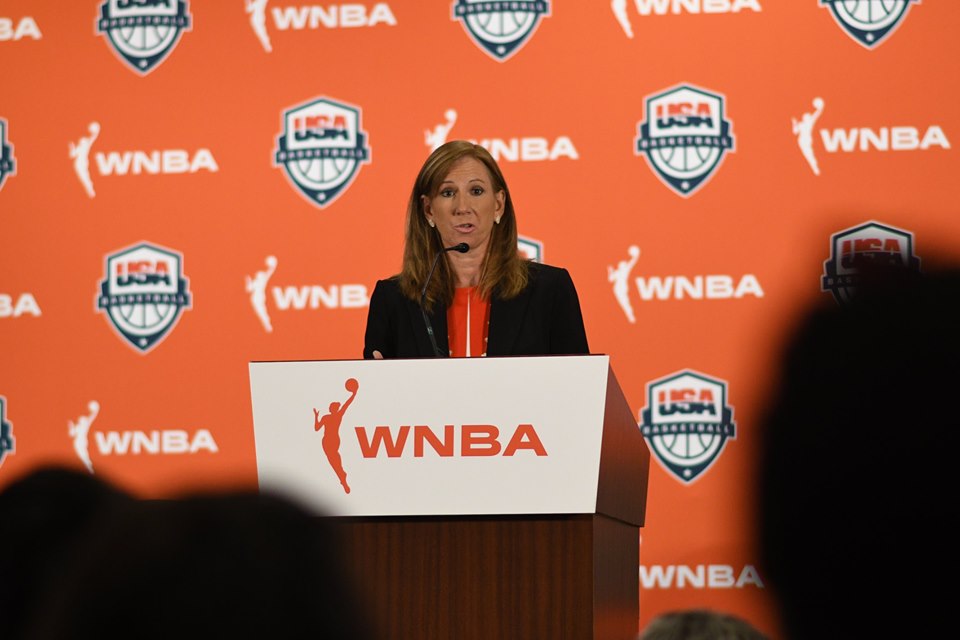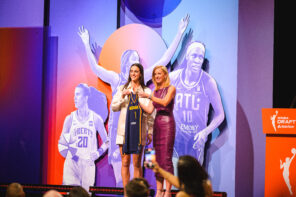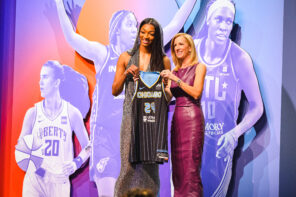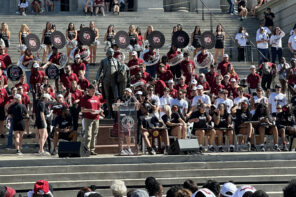The “She Believes Summit” of the United States Soccer Women’s National Team went virtual this year and it was an opportunity to bring together two of the most notable commissioners of women’s professional sport together for a meeting of the minds.
Those two heads of sport were WNBA commissioner Cathy Engelbert and NWSL commissioner Lisa Baird and they joined together for a half-hour “Commissioner’s Conversation” that was moderated by Danielle Slaton, who was once part of the USWNT herself.
Ironically, the seminar was sponsored by Deloitte, where Engelbert worked prior to becoming WNBA commish.
Leaders in the Game 🙌
The Commissioner’s Conversation with @NWSL Commissioner @lisainog and @WNBA Commissioner @CathyEngelbert – moderated by the great @daniellevslaton – is coming right up!
Catch it here or from our friends at @FOXSportsPR! https://t.co/2bdtITE89c
— U.S. Soccer WNT (@USWNT) February 12, 2021
After both commissioners were introduced, Baird began by mentioning what day-to-day operations have been like. She mentioned that the NWSL has had a robust expansion effort and that it is navigating through the coronavirus pandemic as is everyone is. Baird says that the top priority for the commissioner should be to make sure that the teams and league are operating smoothly from both an on-pitch and front-office perspective as well as ensuring that team and league partnerships remain intact.
Engelbert echoed the thoughts of Baird in mentioning that much of what she is trying to do revolves around the idea of transforming the WNBA – including its much-maligned economic structure. She did say that the title of commissioner was one that came up because of the conversation around gender equality and that NBA commissioner Adam Silver had enough confidence in the WNBA to ensure its leader held the same title.
Everything I’m doing now revolves around transformation and strategy … We had a tremendous 2020 season in light of the challenges for Covid, but my day-to-day looked a lot different this past year than I think it would in a normal season.
–Cathy Engelbert, WNBA commissioner
She talked about the importance of building relationships and how those are the key to making sure things work well. Engelbert let it be known that there is plenty of “scenario planning” being done in preparation for the 2021 season, which will also be the 25th anniversary of the WNBA. She also made mention of meeting being had by the WNBA’s Social Justice Council.
Engelbert then was asked about her path to becoming commissioner – one that she viewed as nontraditional. She says that after spending so many years in business at Deloitte, she began getting an itch to want to try something different – a greater women’s leadership platform. She recalled a phone call with someone she had at the NBA who felt that Engelbert would be perfect for the role that was vacated by former league president Lisa Borders.
One of the messages she had for young people preparing to advance into their careers is that one’s first career may not be one’s last career, recalling how she had, as she put it, five different careers while at Deloitte.
Baird, on the other hand, recalled that she had worked plenty of different places en route to the NWSL – including at IBM and at New York Public Radio. Her foray into sports, she says, came when someone at the NFL, who also worked with Baird at General Motors, contacted her and felt she needed to try sports. Baird was hesitant at the time and wanted to continue working in corporate America – until she talked with the NFL.
I really, really was intrigued by what sports can do as, both sport, which is entertainment, but also as something that can be purposeful in society.
–Lisa Baird, NWSL commissioner
She credited the late Paul Tagliabue as well as current NFL commissioner Roger Goodell with bringing her into the NFL, and eventually to women’s sports. Baird mentioned how she was told that football and communities were the hallmarks of the NFL which allowed her to transition to women’s sports – including the Olympics which she described as “primarily driven by purpose.”
I feel like we can use our platform to affect positive change in society, not necessarily for narrow groups of people, but generally because … women’s sports represents half the world’s population. Period.
–Lisa Baird, NWSL Commissioner
Baird says there is momentum around women’s sports and Slaton recalled how that momentum was on full display when the WNBA was a driving force in furthering the conversation around social justice last summer from its bubble in Florida.
Engelbert admitted that she was not too privy to the strong social justice stance of the WNBA when she assumed the job in 2019, but had heard about Maya Moore’s (eventually successful) efforts to get Jonathan Irons freed from prison in Missouri.
My role as the commissioner is to amplify the players’ efforts, not to make it about the league, but to hope the players strategize because they’re not social justice … strategists.
–Cathy Engelbert, WNBA commissioner
Engelbert mentioned that part of what she wanted to do was make sure what the league did around social justice was in sync with its players since its players have different points of emphasis and different methods for how to go about a social justice strategy. This was seen in the bubble with the “Vote (Raphael) Warnock” shirts worn in response to Atlanta Dream co-owner and (at the time) Georgia senator Kelly Loeffler’s comments that were critical of Black Lives Matter.
She recalled from her final days at Deloitte that she began seeing more employee activism which was not always present in her 33 years at the accounting firm.
I think it truly set new precedents for what it means to be a values-driven organization and how companies can step up and support these women and women’s sports …
–Cathy Engelbert, WNBA commissioner
She says that now the focus turns to what the WNBA’s players will do in the future. As for the NWSL, Slaton brought up to Baird that the NWSL is predominantly white, unlike the WNBA which is predominantly Black. Baird says that while she was proud of her players for its Black Lives Matter demonstrations that, because it is less diverse than the W, that it needs to firmly entrench the Black Lives Matter message into the league’s fabric.
Doing that means walking the walk, and ensuring the league’s workforce is as diverse as its message. Baird says that the NCAA is a “pipeline” for attracting people of color into its league and that strides have been made to build a diverse boardroom as well. Naomi Osaka was recently welcomed into the NWSL as its latest owner.
She’s in there, she can help influence the conversation, but it’s also broadening the awareness … among all of owners and making sure that DEI (diversity, equality, inclusion) is going to be a core pillar of who we are as a league. It comes back to us, though, for women. And that’s an area that I think women can continue to make fundamental change in society.
–Lisa Baird, NWSL commissioner
Baird observed, from an NWSL perspective that as her league became more diverse that there was an overall dropoff in the amount of trolling and negativity that was thrown in its direction.
We’re underexposed, we need to be part of it, we need to be out there in all the channels of exposure in building that. But, at the same time, I believe that, women’s sports, we can do it in a way where the treatment of us is more civil.
–Lisa Baird, NWSL commissioner
Slaton then brought up that in most American households that women make the majority of spending decisions. Engelbert brought up data that mentions that the country’s Black population controls $1.4 trillion in consumer spending.
If you’re a company who wants to sponsor the NWSL or WNBA, this data is pretty powerful. And we skew more female fans, and actually increased that.
–Cathy Engelbert, WNBA commissioner
She then mentioned the sobering statistics regarding how women’s sports only receives less 4% of all media coverage and less than 1% of international sponsor money. Engelbert also believes that part of the strategy for the W should be to tell the stories of its players as people away from basketball – in addition to establishing household names and rivalries.
All of these platforms need to determine what values they have and to support women’s sports. We can talk further about what I think’s broken, and the number 1 thing’s the valuation model, which needs to be transformed because it’s based on the men’s model, I’m sure discounted heavily for women.
–Cathy Engelbert, WNBA commissioner
As W fans know, expansion and the possibility of it is something that gets discussed almost regularly among said fanbase – particularly when teams make their final cuts prior to the season. The NWSL has expanded robustly. Baird says part of that has been a concereed effort on the NWSL’s part to do what Engelbert mentioned she wanted to do with the WNBA – expand its reach with the introduction of rivalries and building up marquee names.
I think the thing that we can do as commissioners is make sure that we are … making sure these conversations are happening at the right level in boardrooms all around the country. Not just business, but literally, hey people, this is a real phenom.
–Lisa Baird, NWSL commissioner
What that means is making people know that while the future may be bright, the current year – 2021 – is already looking great. Baird says that part of it takes pushing oneself to instill that message because things could happen behind closed doors that could run contradictory to that positive message of the present “being bright.” An example she gave – calling the numbers during the NWSL’s draft.
She says that her and Engelbert have not talked much, but when they have talked, they were able to exchange ideas and those turned into situations where great minds thought alike. An example Baird gave was if there was a “mom solution” to both the NWSL and WNBA bubbles.
Engelbert made mention that all of the ideas Baird mention sound great on paper, but they lose a great deal of its luster if the money is not there for these ideas.
Lisa and I can do the greatest job in the world at our jobs, but if you don’t transform the way women’s sports is valued … we’re not going to be successful. And that is one thing that, I think, should be on all of our lists as leaders in sports. And that should be on every male leader in sports because we get compared to male sports all the time, which is a very hard and difficult comparison especially when our leagues haven’t been around as long as men’s leagues.
–Cathy Engelbert, WNBA commissioner
Engelbert says that a key element of the optimism should be to always keep in mind that women’s leagues like the WNBA and NWSL are further along at where they are in their histories than many male leagues were when they were at the same point. She then was asked a question towards the end of the summit mentioning what does she want her legacy as commissioner to be – an interesting question to ask given Engelbert is still early (we believe) in her time as WNBA commissioner.
She says that while she was not concerned with the idea of “legacy” while she was at Deloitte, but acknowledged it is natural to think about these things when strategizing an organization’s future is constantly on the brains. Engelbert hopes it is the transformation of the WNBA and that translates into all of women’s sports, particularly in the regions of marketing and sales as well as giving a greater left to girls sports at the youth level.
Engelbert says she also wants it to be defined by how players can use the platform of the WNBA to help themselves with careers after their playing days have finished, which is why that was a key element of the CBA that was struck in early 2020, prior to the pandemic.
Baird mentioned that while she could not see 20 years down the line, she hoped that someone that she had mentored or worked with could become a commissioner of a men’s league.
I love what I’m doing, but the thing that I love is seeing those women that I helped fight for or pushed ahead get into positions that I never could’ve dared to dream of.
–Lisa Baird, NWSL commissioner
As far as what does she wish she would have known then what she does now, Baird says there is “too many.” But she did bring up the concept of “work-life balance,” something that has taken on a whole new meaning thanks to Mr. Covid.
There may be large swaths of your career there you are completely focused on your family, and there may be large swaths of your career where you’re completely focused on working and there are times – I found very them few and far in between where you can do both equally well, but they’re at different points in time.
–Lisa Baird, NWSL commissioner
She says she would have done a better job balancing work and family if she knew then what she does now – and that her children use that as an example. As for Engelbert, she recalls writing a letter to herself and mentioned how being a sports leader is not much different from being a CEO of a company.
Sports is big business, it’s about relationships. But, I’d say … I certainly didn’t know what leadership and I think it’s evolved over time to be much more socially conscious and also leaders need to be very authentic. I think this digital-native population, generation that we have now, Gen-Z and millennials are looking for authentic leadership. Leaders, I think, need to, kind of, build that skill and … it’s different than it was 10 years ago, 20 years ago. And communication, being a great communicator is such an important part of being a leader today.
–Cathy Engelbert, WNBA commissioner
Her closing message was letting people know they can do anything one sets their mind to. She recalled her mother giving her this message that women can do anything men can do since she grew up alongside plenty of them.




